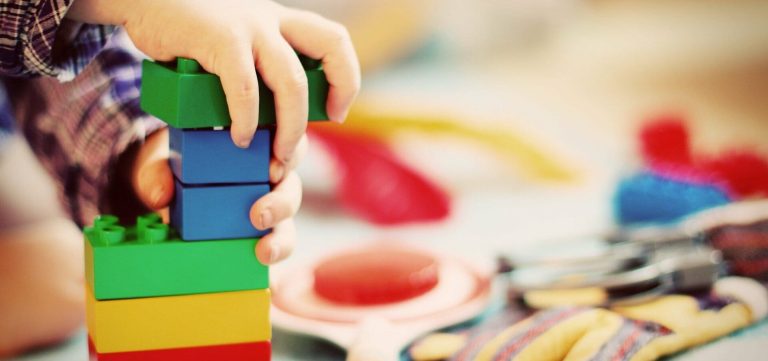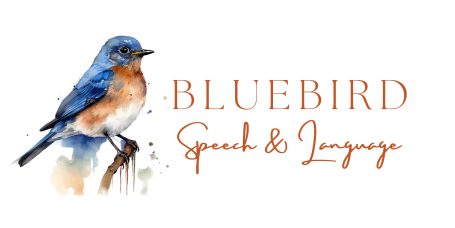.
Bluebird Speech & Language offers child-led, play-based speech and language therapy sessions designed to foster authentic relationships and growth in communication skills.

OFFERING:
- Initial Consultation
- Evaluation
- Therapy Sessions

Bluebird Speech & Language focuses on receptive language, the ability to understand words spoken to you, expressive language, and the ability to use words to express yourself. In addition, our therapy services offers treatment of many speech/language disorders including:
- Articulation & Phonological Disorders
- Language Delays
- Stuttering
- Language Based Reading and Writing Problems
- Autism and Pervasive Developmental Disorders
- Auditory Processing
WHAT IS A SPEECH SOUND DISORDER?
A speech sound disorder is a communication disorder. Children with speech sound disorders have difficulty producing sounds, words or phrases clearly and fluently. Most children can say almost all speech sounds correctly by 4 years old. A child who does not say sounds by the expected ages may have a speech sound disorder.
Only a certified speech language pathologist is qualified to provide a differential diagnose of speech sound disorders such as:
- articulation
- phonology
- Childhood Apraxia of Speech
- structural differences
- physiological deficits
- See Milestones and Parent Resources
Good communication development starts in the first year of life and goes far beyond learning how to talk. Communication development has its roots in social interaction with parents and other caregivers during everyday activities. Your child's growth in social communication is important because it helps your child connect with you, learn language and play concepts, and sets the stage for learning to read and future success in school. Good communication skills are the best tool to prevent behavior problems and make it easier to handle moments of frustration that infants and toddlers face.
Catching communication and language problems early can prevent potential problems later with behavior, learning, reading, and social interaction.
The most critical period for learning is during the first three years of a child's life. Pathways in the brain develop as infants and young children learn from exploring and interacting with people and objects in their environment. The brain's architecture is developing the most rapidly during this critical period. By age 3, most of the major brain circuits are mature, and later it becomes more difficult to make significant changes in a child's growth trajectory.
If early social communication milestones are not solidly in place, it is likely that a child will be delayed in learning to talk. Delays in social communication milestones may indicate risk for development delays, including autism.

MILESTONES THAT DEVELOP BETWEEN
9 AND 16 MONTHS
- Using eye gaze and facial expression to share emotion. Both enjoyment/interest and frustration/distress
- Using eye gaze and communication to share attention, interests and ideas
- Communicating at an increasing rate with gestures, sounds and a few words sprinkled here and there
- Using a variety of actions with objects in play and other everyday activities
- Understanding the meaning of spoken words
WHAT IS GESTALT LANGUAGE PROCESSING?
Gestalt Language Processing (GLP) is a form of language development that starts with whole memorized phrases to single words.
A gestalt language processor learns language in chunks of words rather than one single word at a time.
One of the key signs that your child is a gestalt language processor is the presence of echolalia and scripting. Echolalia is a form of communication.
Gestalt language development is most commonly seen in children with autism, but can be found in neurotypical children as well.

Who Are Speech-Language Pathologists, and What Do They Do?
Speech-language pathologists, also called SLPs, are experts in communication.
SLPs work with people of all ages, from babies to adults. SLPs treat many types of communication and swallowing problems. These include problems with:
Speech sounds—how we say sounds and put sounds together into words. Other words for these problems are articulation or phonological disorders, apraxia of speech, or dysarthria.
Language—how well we understand what we hear or read and how we use words to tell others what we are thinking. In adults this problem may be called aphasia.
Literacy—how well we read and write. People with speech and language disorders may also have trouble reading, spelling, and writing.
Social communication—how well we follow rules, like taking turns, how to talk to different people, or how close to stand to someone when talking. This is also called pragmatics.
Voice—how our voices sound. We may sound hoarse, lose our voices easily, talk too loudly or through our noses, or be unable to make sounds.
Fluency—also called stuttering, is how well speech flows. Someone who stutters may repeat sounds, like t-t-t-table, use "um" or "uh," or pause a lot when talking. Many young children will go through a time when they stutter, but most outgrow it.
Cognitive-communication—how well our minds work. Problems may involve memory, attention, problem solving, organization, and other thinking skills.
Feeding and swallowing—how well we suck, chew, and swallow food and liquid. A swallowing disorder may lead to poor nutrition, weight loss, and other health problems. This is also called dysphagia.
Visit asha.org for more information.

American Speech-Language-Hearing Association's Certificate of Clinical Competence in Speech Language Pathology (CCC-SLP)
Additionally:
- PROMPT LEVEL I Training
- AAC Ally

Meaningful Speech/Natural Language Acquistion
Meaningful Speech is a provider of education about individuals who communicate with echolalia and who are gestalt language processors.
How To Know If Your Child Needs Speech and Language Therapy?
Children begin to learn language very early in life. Speaking, listening, reading, writing, and gestures are all forms of language. As children grow their language skills become increasingly complex.
SIGNS YOUR CHILD MAY NEED SPEECH AND LANGUAGE THERAPY
- Not babbling (4-10 months)
- Saying only a few words (12-18 months)
- Not smiling or interacting with others
- Your child has been stuttering
- Your child's speech is difficult to understand
- Your child isn't talking at school
- Your child has difficulty reading and writing
Speech therapy is most effective when all of the adults in your child's life are involved! By joining in on speech therapy sessions, you will gain the skills to connect and communicate with your child in new, effective ways!
If you have concerns about the development of your child’s speech, please contact us to setup an appointment.
"We cannot recommend Sandra at Bluebird Speech and Language more! We came to Sandra in February for our son when he was diagnosed with a speech sound disorder. She was able to create lessons that were fun and exciting for our highly energetic and spirited boy! She is patient, nurturing, professional and above all kind! Our five year old looked forward to his lessons every single week and the progress he has made has astounded us! We will forever be grateful for Sandra!"
- Kayleigh N.
June 2024
Bluebird Speech & Language
Located in the DragonTree Reading Center
269 Route 31 South, Suite 4, Washington, NJ 07882
(201)874-8861
sandra.bluebirdspeech@gmail.com
© Copyright 2023 Bluebird Speech & Language. All rights reserved.
We need your consent to load the translations
We use a third-party service to translate the website content that may collect data about your activity. Please review the details in the privacy policy and accept the service to view the translations.
